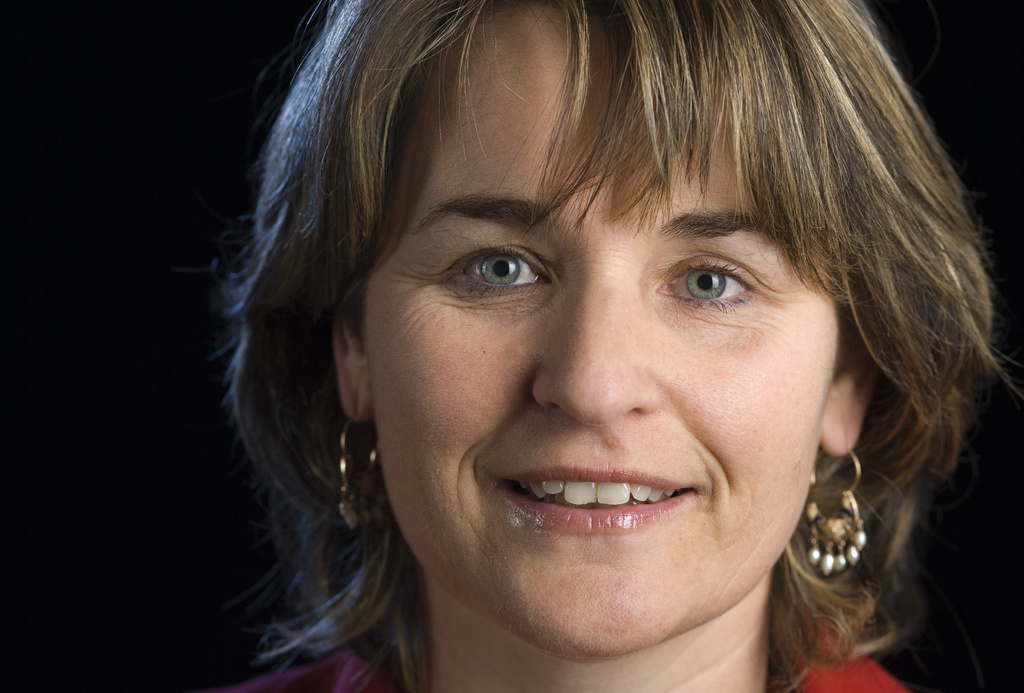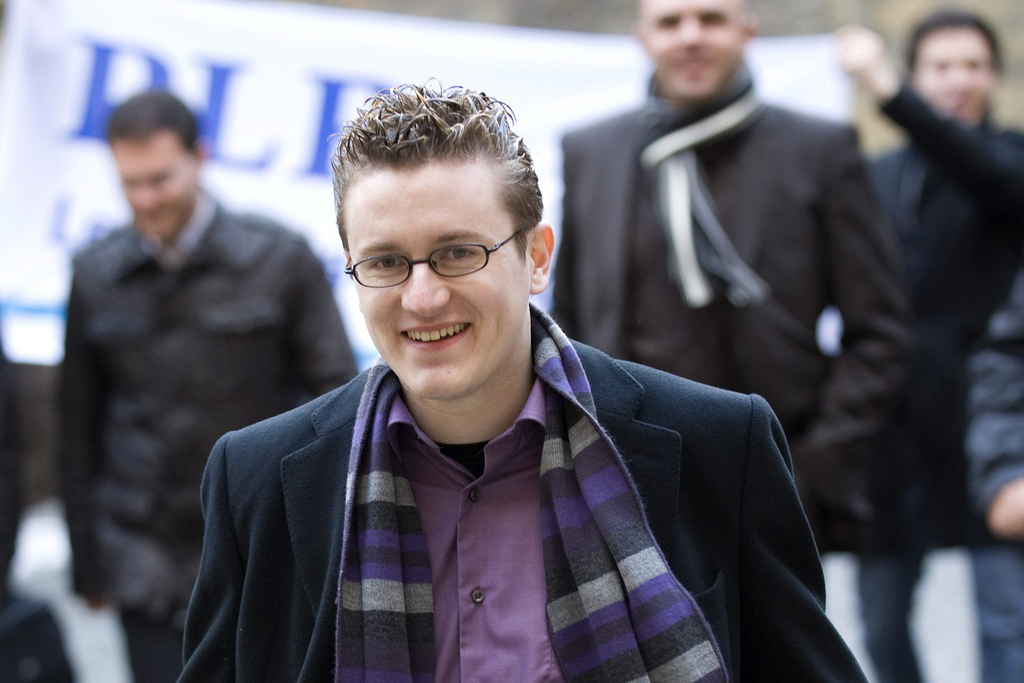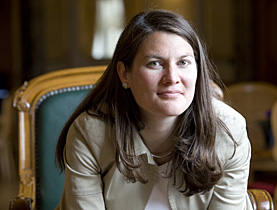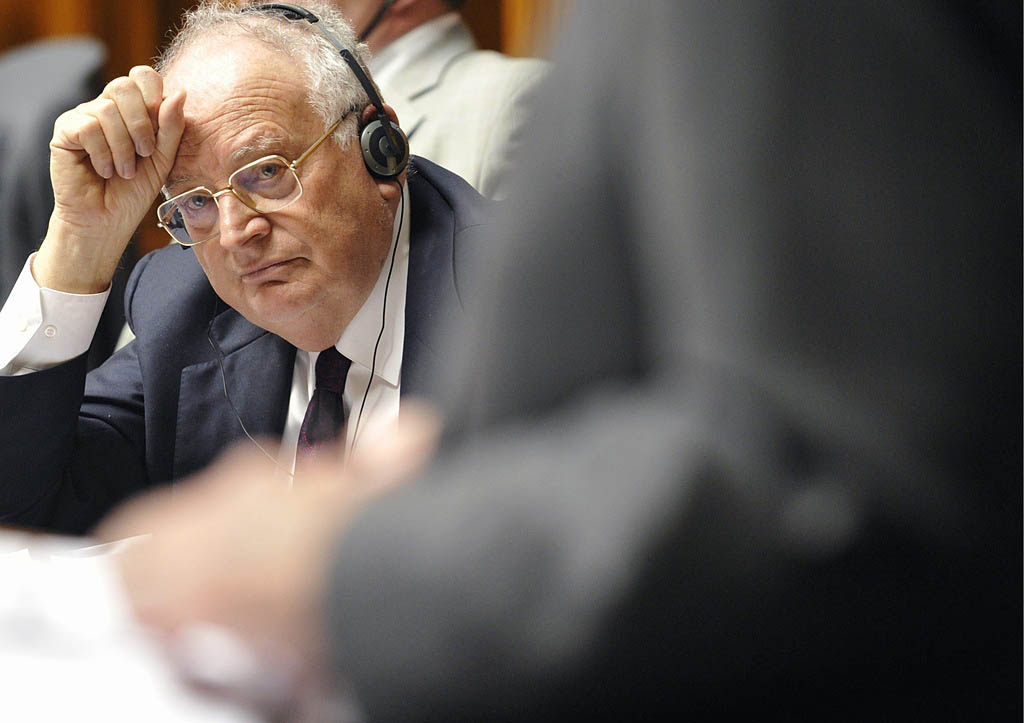“My ideals are a freer and more just society”

Switzerland’s image abroad is too closely tied to the banking sector, says Marina Carobbio Guscetti, a parliamentarian for the Italian-speaking community from Ticino.
In an interview with swissinfo.ch she says the time has come to reassess the traditions of humanitarianism and solidarity that distinguished Switzerland in the past. Taking on major challenges calls for governmental reform.
A medical doctor by profession, Carobbio developed an interest in politics early on: her parents were very active politically, and her father, Werner Carobbio, was a well-known parliamentarian.
Having joined the House of Representatives in 2007, she is now also a vice-president of the centre-left Social Democratic Party.
swissinfo.ch: With parents such as yours, politics was probably always one of the main topics in your family…
Marina Carobbio Guscetti: Yes, even as children we often heard our parents discussing politics. I took an interest in the political activities of my parents even when very young and I began joining in political discussions with them. So I started to engage in politics even as a young person, in student groups, in solidarity movements with developing countries and in women’s movements.
swissinfo.ch: Why, like your parents, did you choose the Social Democrats?
M.C.G.: Above all, it’s a question of the principles of social justice. My ideals are those of a freer and more just society, and one which demonstrates greater solidarity. From a young age I identified with these ideals, which have always been pursued by the Social Democrats.
They will certainly remain part of the party’s new charter for the next ten or 20 years, and which is currently being discussed.
swissinfo.ch: Why is it that, even focusing on these important values, the Social Democratic Party has been losing votes in Switzerland for several years?
M.C.G.: I think we have had difficulty in making these values known outside the party. Communication, which is becoming increasingly important in politics, costs a lot of money, and the Social Democrats have fewer financial resources than other political groups.
In line with its own tradition, the Social Democratic Party also has to re-establish a stronger presence on the ground, for instance by collecting signatures and by participating in demonstrations. For the past two years, with the new presidency, we have tried to move in this direction.
swissinfo.ch: The Social Democrats in other European countries are going through something of a crisis, even in a period of financial turbulence and recession. Why is that?
M.C.G.: I think that this crisis is due to a general tendency for the leaders of the Social Democratic parties in Europe to distance themselves from the problems of the less privileged classes and the middle classes.
The values and ideals that form the basis of socialism – such as social justice and the right to work – must not be forgotten.
swissinfo.ch: Recently, Switzerland has been very isolated and much criticised abroad, for instance in connection with banking secrecy, the anti-minaret issue or the crisis with Libya. Do we have an image problem abroad?
M.C.G.: Having met various people abroad, I have realised that Switzerland does indeed have an image problem. Above all, we have the image of a country that is tied to a banking sector that favours its own business and encourages tax evasion. Often, Switzerland is seen in terms of the usual clichés: a beautiful little country where everyone is very well off.
The image of Switzerland as a country founded on solidarity and a humanitarian tradition, that defends international rights, has been lost.
In my opinion, we have to revive these values and work to make them more widely known. To do this, we need to be more present in international organisations and in particular in European ones.
swissinfo.ch: In the past parliamentary session, the government was again at the centre of harsh criticism because of its lack of communication and strategy during the UBS crisis with the United States. Is there a need for a reform of the government model?
M.C.G.: The UBS affair again showed that the government is not able to deal with major challenges and major crises. Reform is called for, even if this means increasing the number of cabinet ministers to nine. This would make it possible to divide up the portfolios better and, above all, to take better account of a linguistic division of the seats.
Reform of parliament’s working methods would also be a good thing. The sessions deal almost exclusively with topics that have been announced far in advance. This means that we are not on top of current affairs, as demonstrated in the June session by the lack of a genuine debate on the report on the UBS affair.
swissinfo.ch: The topics addressed in parliament also include issues that affect Swiss living abroad, such as electronic voting. Should the introduction of e-voting be accelerated so that Swiss expatriates can participate even more in votes and elections?
M.C.G.: As far as I can see, the Swiss living abroad are very interested in political, economic and social activity in Switzerland, whether for family-related or other reasons. I am therefore in favour of e-voting – and I hope that it is introduced in full – because to me it seems fair that Swiss living abroad should be able to participate in the country’s political life.
swissinfo.ch: Finally, please share a secret with us: how do you manage to juggle being a mother, a member of parliament and a doctor?
M.C.G.: It’s not easy, I admit, but I think that it’s not easy for women who work in general to wear both hats. In my case, I manage to work as a parliamentarian on a 30 per cent basis and as a doctor because I receive a lot of support from my husband, my parents and my family. Compared with other women, I am fortunate to have a good social and family network.
Armando Mombelli, swissinfo.ch (Adapted from Italian by Urs Geiser)
The centre-left Social Democratic Party was founded in 1888 and was excluded from government until 1943 when it won its first cabinet seat.
It has held two cabinet seats in the seven-member cabinet from 1960 onwards.
After the Second World War it became the most popular political party in Switzerland. In the 1980s the Social Democrats won about 28% of the vote, but support has waned since. In 2007 their suppoprt dropped to just over 19% – making them the second largest group behind the rightwing Swiss People’s Party.
The Party has currently 42 seats in the 200-strong House of Representatives and 9 seats in the 46-member Senate.
Born in 1966, Carobbio is married and has two sons.
She graduated from Basel University and currently works on a 30% basis as a medical doctor specialising in palliative care.
Carobbio sat as a representative of the centre-left Partito socialista in the parliament of her home canton of Ticino between 1991 and 2007.
She joined the Swiss parliament in Bern following the last general elections in 2007.
She represents the party in the finance committee of the House of Representatives and is a vice-president of her party.

In compliance with the JTI standards
More: SWI swissinfo.ch certified by the Journalism Trust Initiative















You can find an overview of ongoing debates with our journalists here . Please join us!
If you want to start a conversation about a topic raised in this article or want to report factual errors, email us at english@swissinfo.ch.